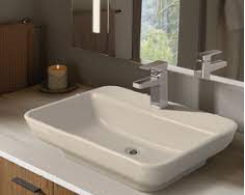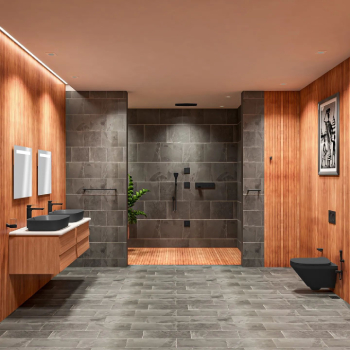
Best Sink Shapes and Sizes for Small Kitchens
When designing a small kitchen, every inch counts. The sink, as a necessary piece of hardware, must also be taken into account with the same seriousness in weighing functionality against space use. This blog tells us the process of selecting the best sink design for your small kitchen, with a focus on shapes, sizes, and design elements that maximize usefulness without packing your usable space.
Understanding Space Constraints

Smaller kitchen spaces are particularly challenging. Take precise measurements of the available counter space before choosing a sink. Keep in mind that the cabinets below sinks will usually be 24 to 36 inches wide. In a small kitchen, allocating too much room for the sink decreases valuable prep space.
Related Link: Choosing the Right Kitchen Sink Design: Which Type Fits Your Style?
Optimal Sink Shapes for Small Spaces

Round and Oval Sinks
Round and oval shapes offer several advantages in compact kitchens:- Softer edges create visual flow
- Often require less countertop cutout space
- Provide adequate depth while minimizing surface area
These sink design options work particularly well in corner installations, where they can transform awkward spaces into functional areas. Manufacturers like Kohler offer elegant oval options that combine functionality with refined aesthetics.

Rectangular Single Bowls
For maximizing depth and width:- Rectangular single-bowl sinks provide generous space for washing larger items
- Clean lines complement modern kitchen designs
- Single configuration eliminates the divider, creating one larger washing area
Many designers recommend single-bowl configurations for small kitchens as they provide more usable space than divided options with the same footprint.

D-Shaped Sinks
This distinctive shape offers practical benefits:- Flat back sits flush against the wall
- Curved front provides comfortable user access
- Maximizes bowl space without extending too far into the room
D-shaped kitchen sink designs are particularly effective in galley kitchens where depth is limited but width can be accommodated.
Related Link: How to Choose the Perfect Kitchen Sink
Size Considerations

Compact Single Bowls (15-20 inches)
These space-saving options work well in extremely tight kitchens:- Bar-sized single bowls (15-16 inches) provide basic functionality
- Mid-sized options (18-20 inches) balance space efficiency with practicality
- Deeper models (8-10 inches) compensate for reduced width
A strategically chosen compact sink can preserve precious counter space while still meeting essential needs.

Space-Efficient Double Bowls
When separate washing and rinsing areas are needed:- Offset designs with one smaller bowl
- Narrow dividers to maximize interior space
- Compact overall dimensions (typically 24-27 inches)
Several Kohler sinks feature innovative divided designs that offer functionality without demanding excessive space.
Material and Finish Options
Stainless Steel
The perennial favorite for small kitchens:- Visually lightweight appearance
- Resistant to stains and damage
- Available in various gauge thicknesses
A brushed stainless finish helps conceal water spots and fingerprints in busy compact kitchens.

Composite Materials
These engineered options offer durability in limited spaces:- Granite and quartz composites resist scratches and stains
- Uniform coloration hides wear patterns
- Often available in space-conscious configurations

Distinctive Finishes
For design-forward small kitchens:- Kohler bronze sink options add warmth and character
- Matte black creates a dramatic contrast
- White fireclay provides timeless appeal
A Kohler bronze sink can be a focal point in a minimalist small kitchen, adding visual interest through its warm, rich tonality.

Installation Styles for Space Optimization
Undermount Sinks
Benefits for small kitchens:- Creates seamless counter-to-sink transition
- Allows for wiping debris directly into the sink
- Provides slightly more bowl capacity within the same cutout
Undermount installations work particularly well with solid surface countertops in compact spaces.
Top-Mount Options
Practical advantages include:- Simpler installation process
- Generally more affordable
- Compatible with any countertop material
Specialty Installations
For extreme space challenges:- Corner sink installation utilizes often wasted space
- Integrated drainboard models combine functions
- Wall-mounted utility sinks free up lower cabinet space

Smart Small Kitchen Sink Ideas
Built-In Accessories
Maximize functionality with:- Integrated cutting boards that slide over the sink
- Colanders that suspend within the bowl
- Custom-fitted dish racks
Workflow Enhancement
Consider these practical additions:- Pull-out faucets to increase range of motion
- Soap dispensers to free counter space
- Instant hot water taps to eliminate kettles
Visual Space Creation
Design tricks to enhance perceived space:- Undermount installations create continuity
- Matching sink and counter colors reduce visual breaks
- Streamlined faucet designs minimize visual clutter
Conclusion
The correct choice of a sink for a small kitchen lies in reconciling size limitations and functional needs. Whether opting for a compact single sink or a creative specialty design, focus on the quality of the materials and well-considered placement. Considering shape, size, and the style of installation, your small kitchen sink can serve you reliably for many years without taking a toll on available space.
Frequently Asked Questions
How long do kitchen sinks last?
If taken proper care of the sinks, they can last upto 15-30 years. Regular maintenance extends lifespan regardless of material.
What are the objectives of the kitchen sink?
Kitchen sinks serve multiple functions: food preparation, dishwashing, cleaning, water access, and sometimes waste disposal. The primary objective is to provide a durable, sanitary station for water-related kitchen tasks while complementing the overall kitchen design.
Does sink size matter?
Yes, sink size significantly impacts functionality. Too small, and washing larger items becomes difficult; too large consumes valuable counter space. The ideal size balances your specific usage patterns with available space constraints.
What is a universal sink?
A universal sink refers to a design that accommodates diverse users and needs. These typically feature accessible dimensions, ergonomic depths, and adaptable configurations that work for users of different heights, abilities, and cooking styles.






